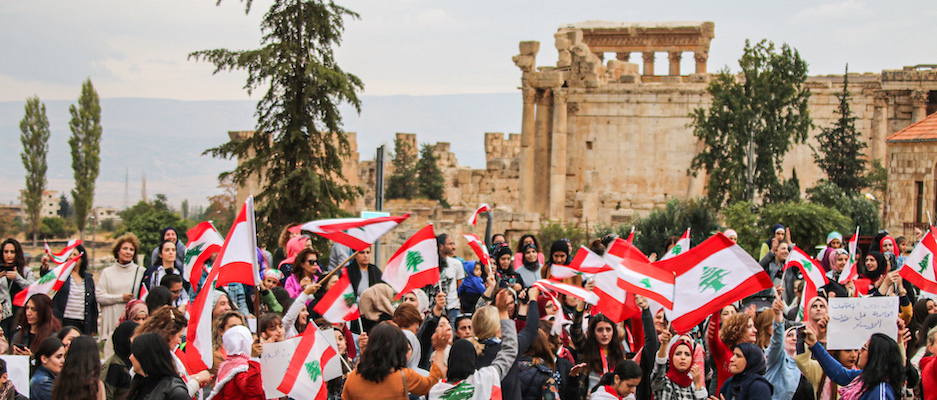As the world marks International Women’s Day, TIMEP speaks to women advocates across the Middle East and North Africa (MENA) region on the ways in which they are challenging the roots of gender inequality.
In this Q&A on Lebanon, TIMEP interviews women’s rights advocate Zoya Rouhana, founding member and director of KAFA (Enough) Violence and Exploitation, a Lebanese civil society organization seeking to create a society that is free of social, economic, and legal patriarchal structures that discriminate against women.
TIMEP: Lebanon’s 2019 protests had strong participation of and leadership by women. Nearly three years on and as the country approaches parliamentary elections, what role are women playing in the political and public sphere today?
ZR: The 2019 protests created a critical space to underscore the different demands of the women’s movement that had been raised in years prior, especially during the past decade. Many feminist demonstrations had been organized before 2019 calling for equality, an end to violence and harassment, the protection of LGBT rights, and the drafting of a civil personal status law, among other calls. The 2019 uprising provided a unique opportunity for women to lead protests and raise these demands and others related to abolishing the patriarchal system. As protests have calmed since then, women organizations have continued their struggle in other forms, such as lobbying the parliament to pass legislation to amend Law No. 293/2014 (Law on Domestic Violence), end child marriage, introduce a quota system, and enshrine a woman’s right to pass her nationality to her family. Now, with the upcoming elections, and following parliament’s refusal to discuss a draft provision on a quota for women, women are exerting significant efforts to run for elections in spite of the obstacles that exist.
TIMEP: In Lebanon today, what would you describe as the most significant issues standing in the way of women’s equality and access to equal rights? What are some of the laws and policies currently in place affecting the equality of women in the country?
ZR: In general, the patriarchal system still governs the lives of women from the moment they are born until they die. Women are not considered independent citizens. This is reflected, for example, in depriving them from having an independent status in the family registrar, where they are registered under their father’s registrar and moved to their husband’s registrar when and if they are married. In the absence of a civil personal status law that would guarantee equality for all women irrespective of sect, personal status issues are governed by 15 patriarchal laws that regulate their familial relationship. All of these laws inflict, whether directly or indirectly, many forms of inequity and violence against women. In spite of the differences that exist between the personal laws associated with different sects, they all largely share many of the same discriminatory provisions against women and place them in a subordinate position to men in society. For example, the laws stipulate that women must obey and follow their husbands; a woman may be found legally “recalcitrant” if she fails to obey her husband and consequently deprived of many rights, including her right to alimony and her right to custody of her children. Women are also restricted in their ability to pass nationality to their husbands and children.
TIMEP: What role have civil society organizations played in the fight for women’s equality in Lebanon? Can you also tell us a bit more about the work of KAFA in this movement?
ZR: Civil society organizations play a critical role in lobbying for women’s rights. They raise awareness and conduct training sessions on the discrimination against women whether on the level of the general community or on the level of decision makers and law enforcement actors. Since the passing of Law No. 293/2014 on Domestic Violence, KAFA has supported individual women in seeking protection orders on the one hand, and has lobbied to introduce amendments to the law to ensure more systematic protections for women. KAFA has also developed a draft law to protect women and girls from all forms of violence; the law would be a comprehensive piece of legislation covering all forms of violence perpetrated against women and girls. In addition, KAFA believes that ending all forms of discrimination against women would not be possible while the country continues to be governed by a confessional system; therefore, KAFA has also drafted a Civil Personal Status Law that would guarantee equality in all issues related to familial relationships in addition to guaranteeing a woman’s full civil status citizenship.
TIMEP: What should the Lebanese government be doing in order to better guarantee women’s access to equal rights?
ZR: There are a number of strategies that have already been drafted by the Lebanese authorities to better guarantee women’s rights and there are a number of laws in place that could be leveraged to better the situation of women in Lebanon. The least that the government can do is implement these strategies, allocate a sufficient budget for these strategies, and enforce the implementation of laws already on the books. Lebanese authorities should additionally take steps to pass a civil personal status law and a comprehensive legal framework to address all forms of violence against women. Finally, authorities must take action to end to the kafala (sponsorship) system that currently governs the relationship between employers and foreign domestic workers, considered by experts to be a form of “modern-day slavery.”
This interview is part of TIMEP’s Forging a Gender Equal World: Women in MENA Q&A series, a collection of interviews with women from and in the MENA region on their work combating gender inequality.
